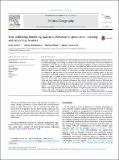Files in this item
Post-trafficking bordering practices : perverse co-production, marking and stretching borders
Item metadata
| dc.contributor.author | Laurie, Nina | |
| dc.contributor.author | Richardson, Diane | |
| dc.contributor.author | Poudel, Meena | |
| dc.contributor.author | Townsend, Janet | |
| dc.date.accessioned | 2017-02-23T11:30:13Z | |
| dc.date.available | 2017-02-23T11:30:13Z | |
| dc.date.issued | 2015-09 | |
| dc.identifier | 249215499 | |
| dc.identifier | 0293b3dd-c27b-46a6-94a0-d2c63d44df51 | |
| dc.identifier | 84936885299 | |
| dc.identifier.citation | Laurie , N , Richardson , D , Poudel , M & Townsend , J 2015 , ' Post-trafficking bordering practices : perverse co-production, marking and stretching borders ' , Political Geography , vol. 48 , pp. 83-92 . https://doi.org/10.1016/j.polgeo.2015.06.001 | en |
| dc.identifier.issn | 0962-6298 | |
| dc.identifier.other | ORCID: /0000-0003-0081-1404/work/64361354 | |
| dc.identifier.uri | https://hdl.handle.net/10023/10340 | |
| dc.description | The research for this paper was funded by the Economic and Social Research Council – ESRC Res-062-23-1490: ‘Post Trafficking in Nepal: Sexuality and Citizenship in Livelihood Strategies’. | en |
| dc.description.abstract | This paper highlights the significance of post-trafficking scenarios for understanding bordering practices in political geography. In so doing, it addresses two significant research gaps: the lack of attention to trafficking in geography and the failure of wider interdisciplinary debates to engage with post-trafficking specifically. While extensive research in political geography has addressed the related experiences of refugees, asylum seekers and 'illegals', much of this work has centred on policies, processes and practices that aim to keep 'unwanted strangers out'. By contrast, very little research has addressed how the border is configured for and by those who are crossing-back over; those who are 'returning home', in this case from diverse trafficking situations. The paper draws on recent empirical research on post-trafficking citizenship and livelihoods in Nepal which examined how women returning from trafficking situations deal with stigma and marginalisation. Our analysis illuminates how bordering practices circumscribe and shape women's lives in powerful ways as they seek to (re)establish a sense of belonging and respect. We examine the interplay of state and non-state actors (national and transnational) in structuring mobility and anti-trafficking advocacy through a range of bordering practices and explore how the border is (co-)produced by varied actors at different border sites. This includes women returning from diverse trafficking situations, who invoke the border to argue that they are 'not as trafficked' as other women, and others who perform the border differently as agents for trafficking prevention. | |
| dc.format.extent | 10 | |
| dc.format.extent | 872317 | |
| dc.language.iso | eng | |
| dc.relation.ispartof | Political Geography | en |
| dc.subject | Anti-trafficiking | en |
| dc.subject | Borders | en |
| dc.subject | Co-production | en |
| dc.subject | Nepal | en |
| dc.subject | Post-trafficking | en |
| dc.subject | Women | en |
| dc.subject | G Geography (General) | en |
| dc.subject | JA Political science (General) | en |
| dc.subject | HN Social history and conditions. Social problems. Social reform | en |
| dc.subject | Geography, Planning and Development | en |
| dc.subject | History | en |
| dc.subject | Sociology and Political Science | en |
| dc.subject | NDAS | en |
| dc.subject | BDC | en |
| dc.subject | R2C | en |
| dc.subject | SDG 16 - Peace, Justice and Strong Institutions | en |
| dc.subject.lcc | G1 | en |
| dc.subject.lcc | JA | en |
| dc.subject.lcc | HN | en |
| dc.title | Post-trafficking bordering practices : perverse co-production, marking and stretching borders | en |
| dc.type | Journal article | en |
| dc.contributor.institution | University of St Andrews. School of Geography & Sustainable Development | en |
| dc.contributor.institution | University of St Andrews. Geography & Sustainable Development | en |
| dc.contributor.institution | University of St Andrews. School of Geography and Geosciences | en |
| dc.identifier.doi | https://doi.org/10.1016/j.polgeo.2015.06.001 | |
| dc.description.status | Peer reviewed | en |
This item appears in the following Collection(s)
Items in the St Andrews Research Repository are protected by copyright, with all rights reserved, unless otherwise indicated.

